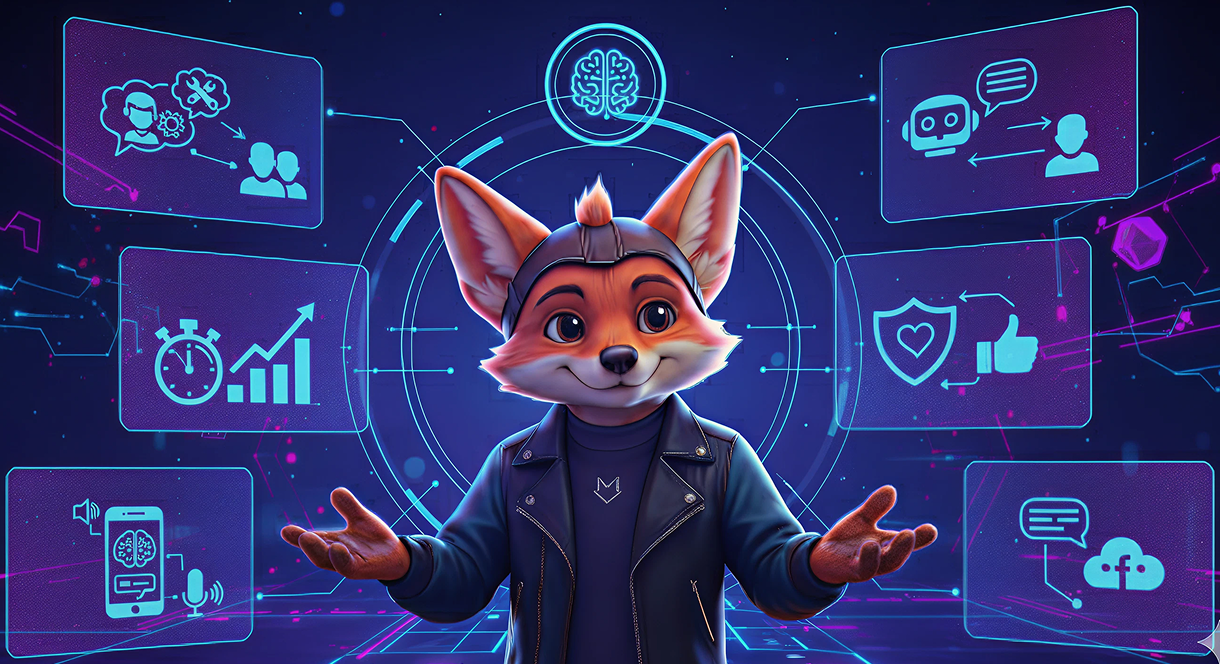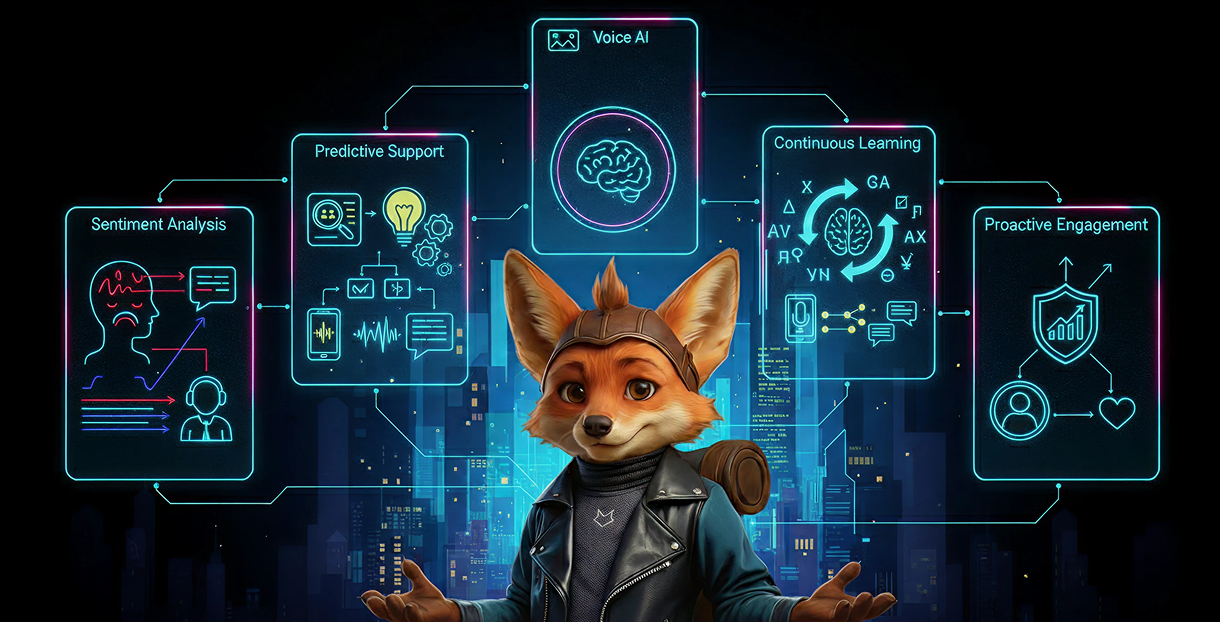Enhancing Customer Support with Virtual Assistants & AI Support Solutions

Table of Contents
- Introduction
- What is a Virtual Assistant for Customer Service?
- The Rise of AI Customer Support
- Key Benefits of AI Support Solutions
- How AI Improves Customer Support Efficiency
- Real-World Use Cases of AI in Customer Support
- The Future of Virtual Assistant Customer Support
- Challenges and Considerations
- Conclusion
Introduction: The New Age of Customer Support
Every business leader knows that customer support can make or break brand loyalty. Studies consistently show that more than 70% of customers will switch brands after just two poor service experiences. For support managers and customer experience leaders, the pressure is mounting: How do you scale customer support, maintain quality, and control costs in a fast-paced digital-first environment?
This is where AI customer support solutions and virtual assistant support come into play. By combining automation with intelligence, these tools are redefining how businesses interact with customers—delivering faster, more consistent, and more personalized support while empowering human agents to focus on complex, high-value cases.
What is a Virtual Assistant for Customer Service?
A virtual assistant for customer service is an AI-powered solution that interacts with customers across digital channels—chat, email, voice, and social media. Unlike traditional chatbots that rely only on predefined scripts, modern AI-powered virtual assistants leverage natural language processing (NLP), machine learning, and contextual understanding.
This allows them to:
- Understand customer queries beyond keywords.
- Provide instant, accurate answers.
- Escalate complex issues to human agents when needed.
- Learn and improve continuously from interactions.
The result is virtual assistant customer support that feels human-like, yet operates at machine speed.
The Rise of AI Customer Support
The global market for AI customer support is projected to surpass $20 billion by 2030, driven by rising customer expectations and the growing need for businesses to scale efficiently. Companies across industries—retail, travel, healthcare, banking, and SaaS—are already deploying AI chatbots for customer support to handle everything from account queries to order tracking and technical troubleshooting.
For support managers, this shift means more than cost savings. It means transforming the customer journey: creating seamless, always-on support experiences that build trust and loyalty.
Key Benefits of AI Support Solutions

1. Efficiency & Cost Savings
An AI support chatbot can handle thousands of inquiries simultaneously. Instead of customers waiting in long queues, they receive instant responses. This reduces the workload on human agents and cuts down operational costs—without compromising service quality.
2. 24/7 Availability
Unlike human teams that need breaks, AI customer support assistants are available around the clock. Whether it’s midnight in New York or morning in Tokyo, customers receive real-time assistance.
3. Personalized Interactions
By integrating with CRMs and support databases, AI-powered virtual assistants can pull customer history and preferences, tailoring responses that feel personalized. This enhances customer satisfaction and loyalty.
4. Consistency in Service
One of the biggest challenges in support is inconsistency across channels. A well-designed customer support AI assistant ensures the brand voice and accuracy remain the same—whether the customer interacts via chat, email, or social platforms.
5. Scalability
As businesses grow, so does the volume of support requests. Hiring and training large support teams is expensive and time-consuming. AI support solutions for customer service scale effortlessly, ensuring no customer query goes unanswered.
How AI Improves Customer Support Efficiency
Support managers often ask: “But does AI really improve efficiency in practice?”
The answer is a resounding yes. Here’s how:
- Reduced Resolution Time: An AI assistant can quickly surface knowledge base articles, FAQs, and troubleshooting steps.
- First-Contact Resolution: By solving routine issues instantly, AI reduces the need for escalations.
- Agent Empowerment: When complex cases are escalated, AI provides context and suggested solutions—helping agents resolve faster.
- Data Insights: AI analyzes interaction trends, highlighting recurring issues that support leaders can proactively address.
For instance, an e-commerce company that implemented AI support chatbots saw a 35% reduction in ticket backlog and a 20% boost in first-contact resolution rates within just six months.
Real-World Use Cases of AI in Customer Support
- Retail & E-Commerce: Virtual assistants provide order updates, recommend products, and process returns—freeing human agents to handle escalations.
- Banking & Finance: AI chatbots manage balance inquiries, fraud detection alerts, and card blocking requests.
- Travel & Hospitality: Virtual assistants help with booking changes, cancellations, and loyalty program queries—enhancing customer satisfaction during stressful moments.
- Healthcare: Patients use AI support solutions for appointment scheduling, prescription reminders, and symptom triage.
- SaaS & Technology: AI-powered assistants provide product onboarding guidance, troubleshoot issues, and manage subscription renewals.
Across industries, the pattern is clear: businesses that integrate virtual assistant support see measurable improvements in efficiency, customer satisfaction, and retention.
The Future of Virtual Assistant Customer Support

Today’s AI assistants already outperform traditional chatbots. But the future holds even more promise:
- Sentiment Analysis: Detect customer frustration in real time and adjust responses or escalate to a human agent.
- Predictive Support: Anticipate customer needs based on behavior and proactively offer solutions.
- Voice AI Integration: With the rise of smart speakers and voice-based interfaces, AI customer support assistants will seamlessly blend voice and text interactions.
- Continuous Learning: Every conversation helps the AI grow smarter, adapting to new phrases, languages, and cultural nuances.
For support leaders, this means moving beyond reactive service to proactive engagement—turning customer support into a powerful driver of brand loyalty.
Challenges and Considerations
While the benefits are undeniable, AI support solutions are not a silver bullet. To succeed, businesses must:
- Integrate AI with Human Teams: AI should complement, not replace, human agents.
- Ensure Data Security & Privacy: Protecting customer data is critical to building trust.
- Train and Update Continuously: AI must be trained on updated knowledge bases to stay effective.
- Balance Automation with Empathy: Human support is irreplaceable for sensitive or complex issues.
Support managers who strike this balance will unlock the true potential of AI while avoiding common pitfalls.
Conclusion: AI as a Strategic Advantage
Customer support is no longer just a service function—it’s a strategic differentiator. Businesses that embrace AI customer support solutions and virtual assistant customer support will not only cut costs but also deliver exceptional, personalized experiences that customers remember.
For customer experience leaders, adopting AI is no longer optional. It’s the key to building agile, scalable, and customer-centric support organizations. The question is no longer “Should we adopt AI?” but rather “How fast can we deploy it?”
FAQs
An AI customer support assistant is a virtual tool that uses machine learning and natural language processing to interact with customers, answer queries, and resolve issues in real time.
A virtual assistant for customer service handles routine queries, provides instant answers, and escalates complex cases to human agents—reducing response times and improving customer satisfaction.
AI chatbots for customer support don’t replace humans; they complement them. AI handles repetitive queries, while humans focus on complex or sensitive issues requiring empathy and judgment.
Retail, banking, healthcare, travel, and SaaS companies benefit significantly from AI-powered virtual assistants, as they manage high volumes of customer interactions daily.
AI improves efficiency by reducing resolution times, ensuring 24/7 availability, and analyzing customer data to proactively solve recurring issues.
Yes, when implemented correctly, AI support solutions follow strict data security protocols and compliance frameworks to protect customer information.
The future includes sentiment analysis, predictive assistance, and seamless voice-text integration, making AI support solutions for customer service more proactive and human-like.
Recent Blogs
-
AI Agent 14 Jan, 2026
Tailored AI Solutions with AgenticAI: Why Customization Is the Real Competitive Advantage
-
AI Automation 12 Jan, 2026
Benefits of AI Workflow Automation: Why It’s Becoming a Boardroom Priority
-
AI Agent 09 Jan, 2026
How to Create Marketing Campaigns Easily with MIA
-
AI Agent 07 Jan, 2026
How MIA’s AI Simplifies Your Hiring and Saves Hours of HR Work
-
AI Agent 05 Jan, 2026
AI Is No Longer an Experiment – It’s Enterprise Infrastructure

